Family genealogy, at its best, teaches about life at the daily level. Unfortunately, digging up information about ancestors of more than a few generations past can often be an exercise in finding odd bits of cold details that fail to convey any sense of the heat of living. This was the frustrating case with the story of my Pierce family line, a line I was connected to through my Grandmother, Ruby Mills (1906-1990), whose father was Charlie Pierce (1873-1939).
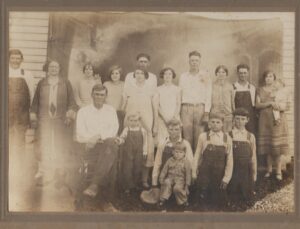
Charlie was a highly successful farmer in the northwest corner of Jefferson County, Illinois, a man I heard many stories about while working in the fields as a boy with older generations. Most of the accounts I heard concerned his hard-driving work habits, his being good with money, and his helpful service to his neighbors and his community. By the time of his death, he owned over two thousand acres of farm ground, possessed a thriving orchard, and raised and sold quality livestock. It is also entirely possible that he worked himself to death, dying at the age of sixty-six one sultry afternoon after chasing some loose hogs.
I can certainly testify to the fact that a strong work ethic was a big deal with the Pierce family. I remember my Grandmother Ruby telling me on many occasions of a phrase her father had often told her: “Whether a job great or small, do it well, or not at all.” Whenever she repeated the phrase, I clearly understood it to be a command and not just some kind of silly nursery jingle.
Charlie’s father, Jack Pierce (1843-1912), was also a hard worker. However, it could be said that he lived a sometimes more colorful life than his son.
Jack purportedly ran away from his home in Boston when he was barely a teenager, securing work on a sea-faring ship that took him to California. Another journey by foot brought him to southern Illinois, where he married a local girl, Anna Wilson. Jack also fought in the Civil War, bringing back two Confederate bills he came across during his march with General Sherman to the sea, items on stiff cotton-like paper I have in my possession today.
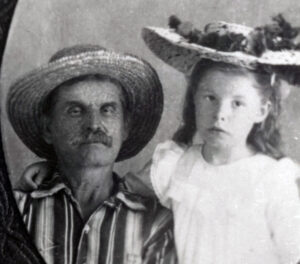
While the stories, documents, and photos I have about Jack Pierce certainly reveal a full and rich life, Jack Pierce’s initial leaving of Boston, one that indicated a possible family misunderstanding, left a great black hole when it came to knowing detailed information about the rest of my Pierce relatives in New England, those who proceeded Jack, including Jack’s father, Jonas Pierce.
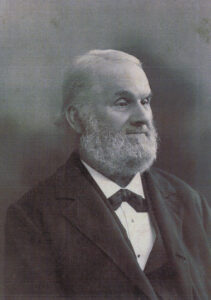
Ironically, my New England Pierce family has been written about more than most American families, with several 19th century books, magazine articles, and newspaper accounts featuring stories about the original colonial Pierce house built in 1640 and the adventures of family members starting from the time Robert and Ann Pierce’s landed in the Massachusetts Bay colony around 1630. According to an 1890 Chicago Tribune article about the colonial Pierce family, Robert was a descendant of the Second House of Percy, Earls of Northumberland. With this royal line came a Pierce coat-of-arms, along with a Latin motto that translates “I said it. I did it.”
From my experience with this part of my family, that’s about as Pierce as you can get.
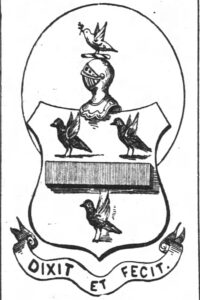
Another narrative I came across noted, “The history of the Pierce family, ten generations of whom lived in the Pierce House, highlights important aspects of social history, community history, and New England history.” Today the Pierce house is owned by the city of Boston and serves as a quaint museum most often used for school class field trips.
From documents such as these, I discovered my family clan produced prominent New England clergymen, civic leaders, educators, musicians and vocalists, craftsmen, and even a United States president, Franklin Pierce.
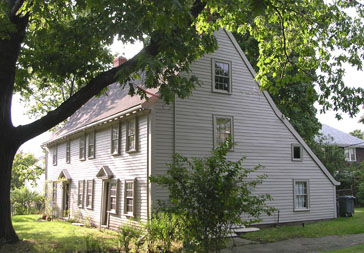
It was a rigid Puritan world in which the New England Pierce family members thrived, a world so different from the unruly frontier people of the upland south who flooded into southern Illinois like the rest of my dad’s people. So devoted to strict religious doctrines was the Yankee Pierce clan, that one prominent Pierce minister, in the early 1800s declared that “The Pierces have always been a godly race.” Hard work and frugality were two other traits Pierce family members almost always seemed to possess. Yet, all of these aspects, as my Grandma Ruby would eventually suggest to me, may have been virtues that sent Jack Pierce packing for parts unknown when he ran away from Boston in the late 1850s.
**************************************************************************************
One unusually hot day in early fall, probably around my twelfth year, as I struggled to move four giant metal tubs that held my Grandma Ruby’s caladiums from the outdoors to the basement, I learned for the first time of her grandfather, Jack Pierce. I am sure that subject normally would have been of great interest to me, but I was overheated and distracted that day, and certainly not in the mood for a yarn.
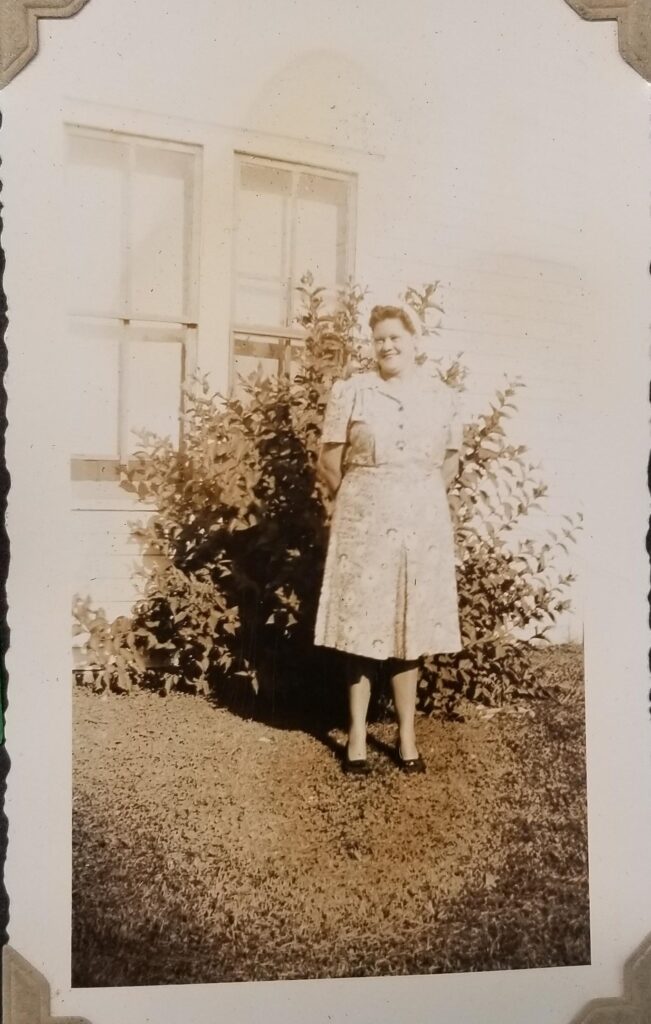
Grandma was not discouraged. She followed me down the stairs to the basement, jabbering away as I wobbled and teetered under the weight of the first gigantic tub she had ask me to move. I only picked up on what she was saying after I finally got the tub put away.
“As a boy, my grandpa ran away from Boston and got work on a ship going out to sea, escaping his strict father and his Puritan-bred Boston family. His ship circled Cape Horn on its way to California, traveling through several storms. But he didn’t like it out west. He walked back east until he got to southern Illinois, where he gave up ever getting back to Boston and married a local girl, Anna Wilson, my Grandmother.”
As I came back up the stairs to get another tub, she continued to follow me and tell me more of the story, one told with such preciseness, that I knew it had been repeated many times before, its telling, a worn, friendly path.
I stopped and sat myself on the top step and finished listening to her tale.
After I brought down the last tub and returned upstairs, Grandma led me to a sideboard cabinet parked against a wall in her kitchen. From a top drawer, she pulled out a small stack of letters held together by a ragged blue ribbon, along with an old studio photo printed on cardboard.
Family tradition asserted that Jack Pierce later reconciled with his father, Jonas Pierce, shortly before the latter’s man’s death, This was verified in an 1897 letter a visiting Jack Pierce sent home to his son, Charlie, a part of which Grandma read to me. “I was in Boston two weeks. I found all the folks well and had a pleasant time. It was a good trip and I’m glad I went.”
During the 1897 visit to Boston, Jack Pierce had several photos made at a local studio—The Rembrandt Studio—including one of him dressed in a handsome suit and fine winter dress coat and holding an expensive top hat.
Looking at the photo the day Grandma first showed it to me made me wonder if Jack had wished his father to know that he had done well with his life, in spite of running away. I sorely wondered too what Jonas Pierce thought about the matter, and what his life had been like.
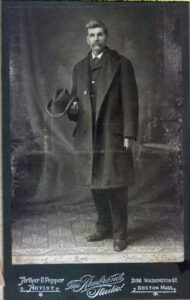
Another unexpected source offering clues as to the personality of Jonas Pierce came from Frederick Clifton Pierce’s 1880 book, Pierce Genealogy. The book went into some detail regarding the occupations down through the generations of many of the Pierce males, and it is interesting to note that the one Pierce who settled in southern Illinois, my great-great grandfather, John “Jack” Pierce, had three generations of previous relatives—a great-grandfather, a grandfather, and a father—who all leaned toward working-class vocations. The great grandfather was a shoemaker, his son, a cabinet maker, and Jack’s father, Jonas, held several jobs—as a ship-joiner, as an express wagon hauler of local goods with his brother, as a caterer, and, finally, as a janitor.
There were surely complexities in Jonas’s life. One I stumbled upon came from examining marriage and birth records. Mary Whittemore was six years younger than Jonas when they married, and their first son, John “Jack” Pierce, came along six months later in 1843. One wonders how this situation might have been perceived in the strict New England culture of that day. Still, none of the above information gave me much sense of what Jonas Pierce was really like. I had little inklings, for example, of how well he carried out his vocation, or of his temperament, or of any of the difficult events that might have shook-up his world. Thus, it was with great interest that I recently found several old Boston newspaper articles online which finally offered some interesting bits of information about my ancestor.
All the Pierce family members in southern Illinois that I grew up around were hard workers, and the many stories I heard as a young boy about Charlie and Jack Pierce almost always centered on how hard they labored and how successful that work made them. Thus, I was not surprised that almost every newspaper article I found about Jonas concerned his work.
As I noted, Jonas carried out several vocations in his lifetime—working as a ship-joiner, as an express wagon hauler of local goods with his brother, as a caterer, and as a janitor at several schools. It would be in the last two occupations, however, that he would come to be well known and esteemed for in the Roxbury section of Boston.
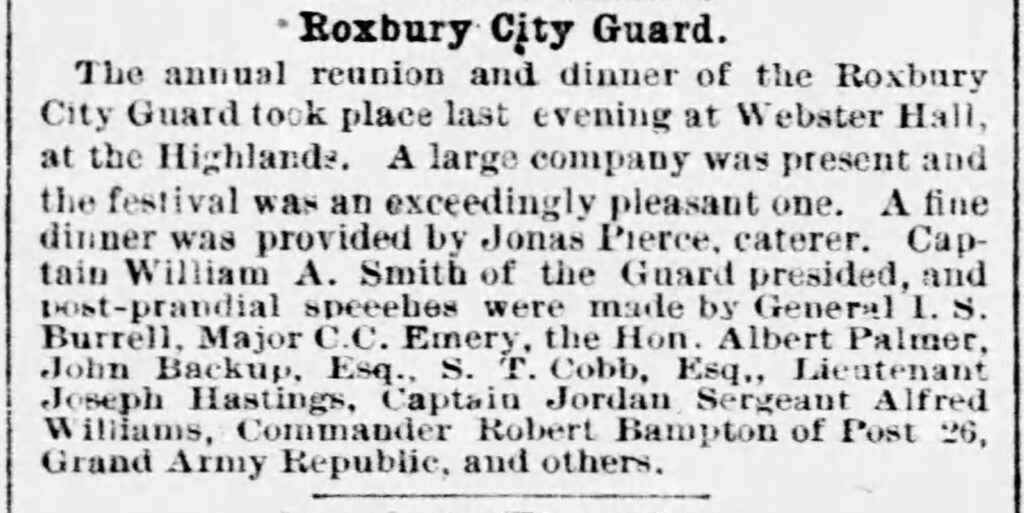
Throughout the 1870s, the front page of the Boston Globe reported almost weekly of a Boston banquet which Jonas Pierce catered, often mentioning of his service’s high quality. At the Roxbury City Guard reunion in 1876, for example, an article noted that “A large company was present, and the festival was an exceedingly pleasant one with a fine dinner being provided by Jonas Pierce, caterer.” Jonas’s catering gigs involved gatherings in Boston, as well as farther out into New England, and included medical conferences, farm shows, and the “twentieth annual ball of the Boston Caledonian Club,” to name a few.
Perhaps the most impressive catering job my ancestor performed was providing food for the centennial celebration of the Battle of Bennington, in Vermont in 1877. Ten regional governors and several thousand people attended. The Rutland Vermont Daily Globe reported, “The Bennington celebration managers have secured two large tents under which the orations will be given, a banquet tent, 400 feet by 50, with a roomy wing, capable of seating 3,500 persons, and several marquee tents for dignitaries and the press. Caterer Jonas Pierce, of Boston, will serve the banquet to invited guests.
The Pierce family was also involved in social activities in the Boston area at this time, with Jonas’s wife, Mary, often showing up in articles about cultural events and community get-together’s. The Boston Globe even mentioned how she had won a prize “at the Progressive Euchre Party at Roxbury.”
But things were not always rosy for the family.
A tragedy struck Jonas’ family in 1881 when his beloved daughter, Mary, died unexpectedly at the age of thirty-seven. The story of the sad event was reported on the front page of the Boston Globe, under a headline that read “A Double Affliction.” Mary’s husband sent for his mother upon Mary’s sudden death. When the mother-in-law came rushing into the room, “she immediately sank to the floor” and died of shock. The article also noted that Mary was the daughter of the well-respected Jonas Pierce.
Life, of course, went on. By the early 1880s, Jonas had moved to another job, his name now appearing in several Boston Globe articles about the city’s school janitors. In 1886, he was elected the vice-president of the Boston School Janitors Mutual Benefit Association. He served as janitor at the Dudley school for twenty years.
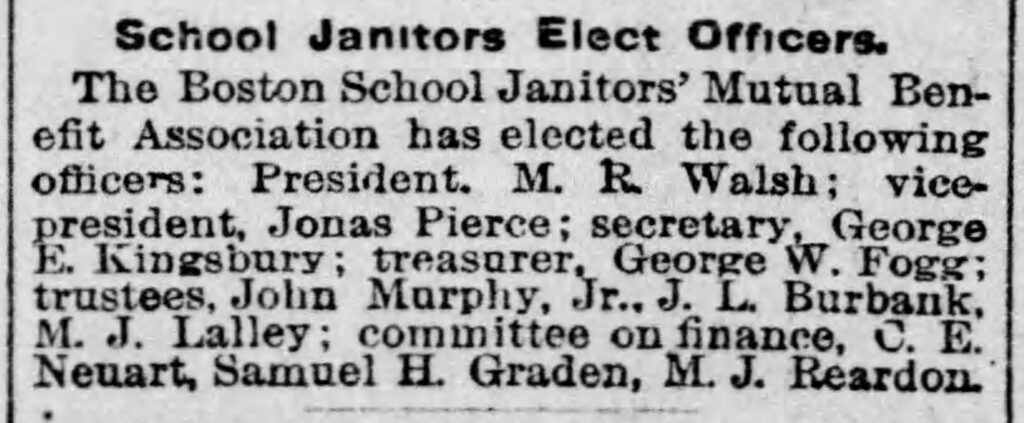
Jonas died in 1901, at eighty years of age. The Boston Globe noted in his obituary that he was highly esteemed from having “formed the acquaintance and won the respect of hundreds of boys and girls who since have gone out into the world. He was a great favorite with the pupils, and his kindly consideration will be remembered by hundreds of young children of Roxbury.”
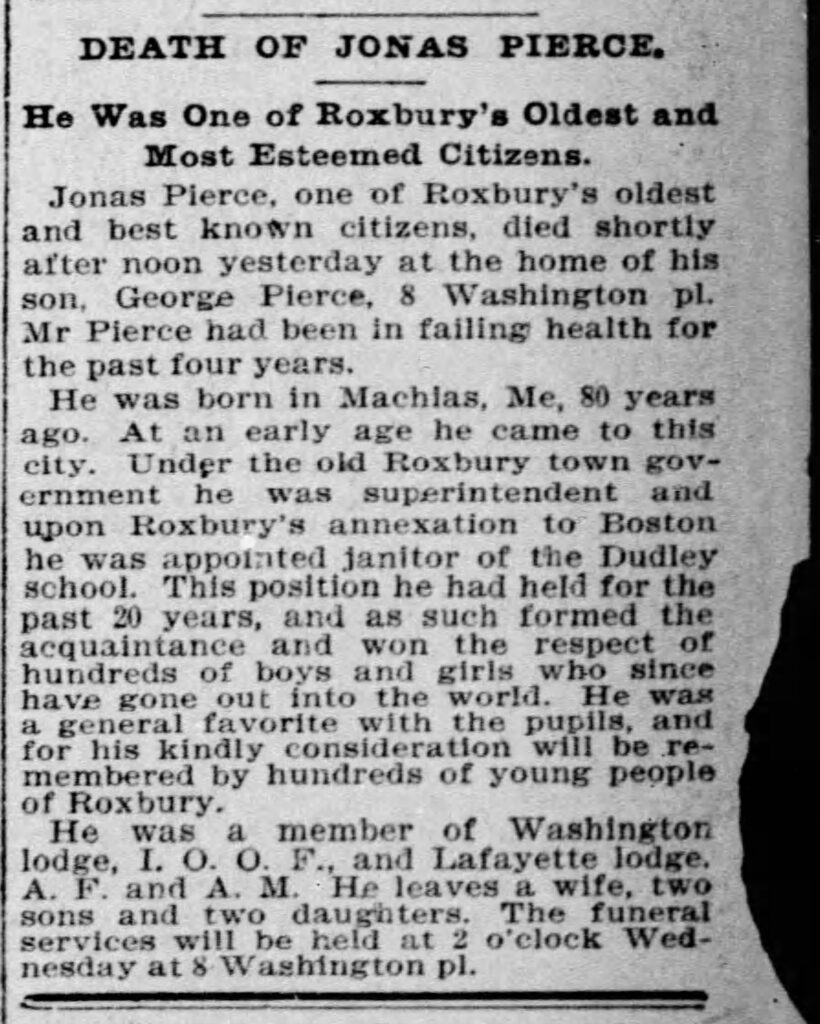
The last article containing Jonas’s name occurred in the same year as his death, a notice of Mary Whittemore Pierce’s passing. Jonas’s wife died just four months after her husband.
Finding and reading those few newspapers articles served to give me a much better sense of my ancestor, Jonas Pierce, a man who I now know worked hard in the Pierce fashion, loved to be of service to people and to his community, and faced the highs and the lows of life with a good spirit. I may never know what initially caused Jonas’s son to leave Boston, whether a fight between father and son, or just wanderlust on Jack Pierce’s part. I do know that I am now able to count Jonas among my ancestors whose lives inspire me today, especially in terms of understanding one’s work as being something to throw your heart into, doing it well, or not at all. I like to imagine too Jonas being aware of his all southern Illinois descendants today, happy with their successes and their contributions to their community.